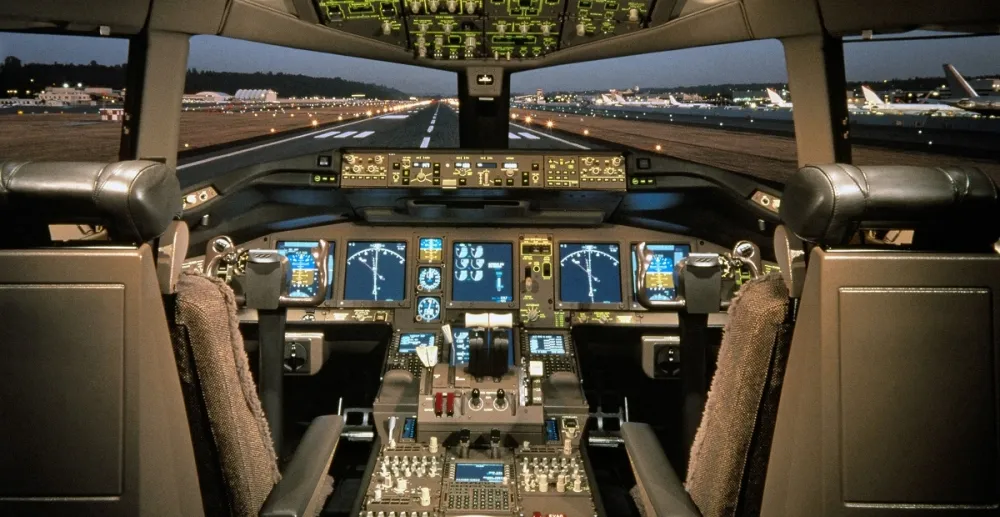
Boeing forecasts improved pilot job prospects.
Jul 25, 2017

Boeing has recently updated its forecast for pilot job opportunities, indicating a more positive outlook for the aviation industry. The company anticipates a significant demand for pilots over the next two decades, driven by the recovery of air travel and the introduction of new aircraft. This projection highlights the need for skilled pilots to meet the growing operational requirements of airlines worldwide. As travel continues to rebound post-pandemic, aspiring pilots may find increased opportunities and a more favorable job market. Boeing's forecast reflects confidence in the industry's resurgence and the essential role pilots will play in its future.
The aviation industry is experiencing a significant shift, and "Boeing's" latest forecast for pilot job prospects highlights this positive trend. With an increasing demand for air travel and the retirement of seasoned pilots, the opportunities for aspiring aviators are on the rise. In this article, we will delve into the factors driving this demand and what it means for the future of "pilot careers". We will also present a chart that illustrates Boeing's projections for pilot job openings over the next decade.
Factors Contributing to Increased Pilot Demand
Several key factors are fueling the growth in demand for pilots. Understanding these elements can help both aspiring and current pilots navigate their career paths effectively.
1. Rising Air Travel Demand: The global demand for air travel continues to soar. As economies recover from the pandemic, more people are eager to fly for both business and leisure. This resurgence is prompting airlines to expand their fleets and routes, thereby increasing the need for qualified pilots.
2. Pilot Retirements: A significant number of pilots are reaching retirement age, creating a gap in the workforce. According to "Boeing's" projections, approximately 50% of pilots currently working will retire within the next decade, leading to a substantial increase in job openings.
3. Technological Advancements: Innovations in aviation technology, including more fuel-efficient aircraft, are making air travel more accessible and cost-effective. This technological evolution requires skilled pilots who are adept at operating modern aircraft.
Boeing's Pilot Demand Forecast
Boeing's latest report provides a detailed analysis of the anticipated demand for pilots over the next 20 years. The data indicates a robust growth trajectory in pilot job opportunities. Below is a table summarizing Boeing's forecast for pilot demand:
| Year | Estimated Pilot Demand | Commercial Pilots | Business Aviation Pilots |
|---|---|---|---|
| 2023 | 3,000 | 2,200 | 800 |
| 2025 | 3,500 | 2,700 | 800 |
| 2030 | 5,000 | 3,800 | 1,200 |
| 2035 | 7,000 | 5,200 | 1,800 |
| 2040 | 9,000 | 7,000 | 2,000 |
The above table clearly demonstrates an upward trend in the estimated demand for pilots. By 2040, Boeing projects that there will be a demand for approximately 9,000 pilots, with commercial pilots making up a significant portion of this figure.
The Path to Becoming a Pilot
With the demand for pilots on the rise, many individuals are considering a career in aviation. Here’s a brief overview of the steps involved in becoming a pilot:
1. Education: A high school diploma is the minimum requirement to begin flight training, but many airlines prefer candidates with a college degree. Pursuing a degree in aviation or a related field can enhance job prospects.
2. Flight Training: Aspiring pilots must complete flight training through an accredited flight school. This training typically involves a combination of ground school and flight hours with a certified instructor.
3. Obtain Licenses: Pilots must obtain various licenses, including the Private Pilot License (PPL), Instrument Rating, and Commercial Pilot License (CPL). Each license has specific requirements and assessments.
4. Gain Experience: Accumulating flight hours and diverse experience is crucial for career advancement. Many pilots start by working as flight instructors or flying for smaller companies to build their hours.
Conclusion
The future of pilot careers looks promising, with "Boeing's" forecasts indicating a strong demand for pilots over the next two decades. Aspiring aviators have a unique opportunity to enter a thriving industry at a time when job prospects are on the rise. By understanding the factors driving this demand and following the necessary steps to become a pilot, individuals can position themselves for successful careers in aviation.
For those interested in pursuing a career as a pilot, it’s essential to stay informed about industry trends and continue developing your skills. With the aviation sector poised for growth, now is the perfect time to take flight into a rewarding career.
Related Articles

Explore Thailand: The Best Islands to Visit for Paradise, Adventure, and Relaxation

The Ultimate Guide to the Best Islands in Thailand for Your Next Getaway

Do babies need passports? How to get a passport for a newborn

How to get a U.S. passport fast: here’s how to expedite the process

What is Mobile Passport Control: 5 reasons why you should use it

SENTRI vs. Global Entry: A detailed guide

Do you need a passport to go to the Bahamas? Let’s find out

Do you need a passport to go to Mexico? A detailed guide

Do you need a passport to go to Canada? We got the answer

Do You Need a Passport for a Cruise: An Essential Travel Guide

Booster Seat Requirements: All the Rules to Follow in Your Rental Car

What Are the World’s Most Powerful Passports, and How Does Yours Rank?

How to Take a Passport Photo at Home: A Helpful Guide

You've got to have heart! Southwest's new livery

Your opinion: Should water be free on low cost carriers?

Young women bolder than guys as solo travellers
